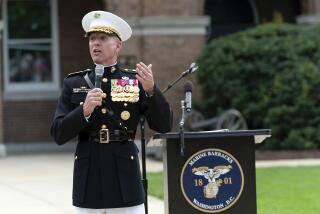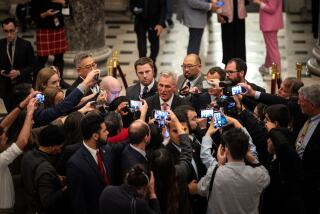McChrystal to meet with Obama after deriding top civilian officials
- Share via
Reporting from Washington and Kabul, Afghanistan — Gen. Stanley A. McChrystal, the commander of Western forces in Afghanistan, was summoned to Washington on Tuesday to explain unflattering comments about senior members of the Obama administration that appeared in a magazine profile.
Earlier in the day, before his planned departure from Afghanistan, McChrystal issued a statement apologizing for the remarks that appeared in a forthcoming profile in Rolling Stone magazine. The dismissive comments were a “mistake reflecting poor judgment,” he said.
President Obama directed McChrystal to personally attend a scheduled monthly meeting on Afghanistan and Pakistan at the White House on Wednesday, rather than participate by teleconference, according to an Obama administration official speaking on the condition of anonymity. At the meeting, McChrystal will be told to “explain to the Pentagon and the commander in chief his quotes in the piece about his colleagues,” the official said.
McChrystal’s controversial comments come at a particularly sensitive time: the U.S. and allied troops are focused on a campaign to wrest control of the Taliban heartland around Kandahar from the insurgent movement. With a week left in the month, June is already one of the deadliest in the long Afghan conflict. Ten Western troops died Monday, and one more on Tuesday.
At the Pentagon, Defense officials were left wondering whether McChrystal would be able to survive the blowback from the article or if he would need to resign. Military officials in Kabul who spoke on the condition of anonymity confirmed the resignation of his senior civilian press aide, Duncan Boothby, over the remarks.
Western diplomats in Kabul expressed concern about a worsening split between civilian and military officials there. If McChrystal steps down, the counter-insurgency strategy he has developed probably would suffer a serious setback.
In the Rolling Stone profile, McChrystal and his advisors appear to ridicule Vice President Joe Biden and are portrayed as dismissive of civilian oversight of the war.
The article said McChrystal’s staff frequently derided top civilian leaders, including special envoy Richard C. Holbrooke and U.S. Ambassador to Afghanistan Karl Eikenberry.
The White House has felt boxed in by military commanders anxious to get more troops for the war. The article said that only Secretary of State Hillary Rodham Clinton received good reviews from McChrystal’s inner circle.
McChrystal is reported as visibly exasperated by e-mails he receives from Holbrooke, appointed by Obama to oversee developments in Afghanistan and Pakistan.
“Oh, not another e-mail from Holbrooke,” the article quotes McChrystal as saying after receiving one message. “I don’t even want to open it.”
The article’s author, former Newsweek writer Michael Hastings, said that McChrystal and his staff, while preparing for a question-and-answer session in Paris, imagined ways of dismissing Biden “with a good one-liner.”
“Are you asking about Vice President Biden?” McChrystal said, according to the article, trying out a possible answer. “Who’s that?”
In a speech last summer, just as a White House strategy review was beginning, McChrystal appeared to criticize Biden’s argument in favor of fewer troops. Obama later dressed down McChrystal for his comments and for the implied criticism of Biden. The Rolling Stone article does not specify whether McChrystal was again criticizing Biden or possibly poking fun at his own difficulties last year.
In a new book about Obama’s first year in power, author Jonathan Alter wrote of a showdown in the Oval Office last year on just this issue. Obama told Defense Secretary Robert M. Gates and Adm. Mike Mullen, chairman of the U.S. military’s Joint Chiefs of Staff, that he was “exceedingly unhappy” with the Pentagon’s leaks and maneuvering in the run-up to the decision to send more troops to Afghanistan, according to the book.
Gates said in a statement Tuesday that the Rolling Stone article was a distraction from the war effort.
“I believe that Gen. McChrystal made a significant mistake and exercised poor judgment in this case,” he said.
Gates did not make an explicit statement of support for McChrystal, as some of the general’s defenders had hoped. Instead, Gates made clear that McChrystal had been recalled to Washington to discuss the article and defend himself. Mullen expressed “deep disappointment” during a telephone call to McChrystal, a spokesman told Reuters news service.
McChrystal’s allies said they were unsure what Obama would do, but there was clear concern that the general could be relieved.
“If precedent is followed, it could be bad,” one senior military official said. In 2008, the commander of U.S. Central Command, Adm. William “Fox” Fallon, was forced to resign after a magazine article that suggested he was personally preventing the Bush administration from invading Iran.
Sen. John Kerry (D-Mass.), chairman of the Foreign Relations Committee, suggested the White House should not act too hastily.
Kerry said his “impression is that all of us would be best served by just backing off and staying cool and calm, and, you know, not sort of succumbing to the normal Washington twitter about this for the next 24 hours.”
In a joint statement, Sens. John McCain (R-Ariz.), Joe Lieberman (I-Conn.) and Lindsey Graham (R-S.C.) called McChrystal’s comments, as reported, “inappropriate and inconsistent with the traditional relationship between commander-in-chief and the military.”
“The decision concerning Gen. McChrystal’s future is a decision to be made by the president of the United States,” they said.
The Taliban, somewhat predictably, reacted to McChrystal’s predicament with glee. Spokesman Zabiullah Mujahid called it a sign of disarray, and “the beginning of political defeat” for the West in Afghanistan.
In the months since tensions broke into the open over Eikenberry’s opposition last year to the troop increase urged by McChrystal, the two have sought to put a cordial public face on their relationship. When speaking of the general to others, Eikenberry often refers to him as Stan.
After news of McChrystal’s comments broke, the U.S. Embassy — which has been embarrassed by continuing reports of tensions between senior American military and civilian officials — suggested Tuesday the two men could still work together.
“As Ambassador Eikenberry has said on many occasions, he and Gen. McChrystal are both fully committed to the president’s strategy, and to working together as one civilian-military team to implement it,” embassy spokeswoman Caitlin Hayden said in an e-mailed statement.
However, two Western diplomats in Kabul who deal often with both men said McChrystal’s remarks probably represent an irretrievable rupture because the enmity between the two would now be a distraction to crucial civilian-military efforts, particularly in the key provinces of Kandahar and Helmand.
Barnes reported from Washington and King in Kabul. Peter Nicholas and David S. Cloud in Washington contributed to this report.
More to Read
Sign up for Essential California
The most important California stories and recommendations in your inbox every morning.
You may occasionally receive promotional content from the Los Angeles Times.










